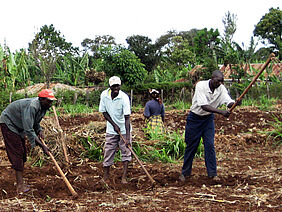With the help of local partners, FiBL began research on long-term farming systems comparisons between 2005 and 2007 in three countries: Kenya, India and Bolivia. The objective of the three experiments is to provide solid data on the performance of major agricultural production systems, including organic farming, in a long-term scope. It is expected that this data will provide information on best practices for farming that will in turn help improve food security and livelihoods in the tropics.
FiBL has a history of successful long-term experiments, including a trial that has been running since 1978—widely known as the DOK-trial—which produced data for findings that were published in Science in 2002 (Mäder et al, 2002). The results show the potential and advantages of organic farming regarding resource efficiency, ecosystem functioning and soil fertility conservation, while maintaining a high production level. Organic agriculture could thus be a promising option for sustainable agricultural intensification in the South. Since data comparing agricultural systems in the tropics is scarce, these long-term experiments will help provide more information crucial to the sustainability of farming.
“The website serves to inform and build awareness about the need for more research into sustainable agriculture systems in the tropics,” noted Dionys Forster, project coordinator for the comparison in India. The project website includes information on the trials, the various methods used, goals and outcomes as well as expected results.
Further information
Contact
- Dionys Forster
Links
- Systems-comparison.fibl.org: Project website
References
Mäder, Paul; Fliessbach, Andreas; Dubois, David; Gunst, Lucie; Fried, Padruot and Niggli, Urs (2002) Soil Fertility and Biodiversity in Organic Farming. Science, 296, pp. 1694-1697.




